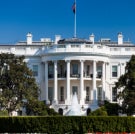Global stock markets led by the UK and Europe have been boosted while the US dollar has surged as traders around the world react to Donald Trump winning the US presidential election.
The UK’s FTSE 100 jumped by about 1.5 per cent when markets opened on Wednesday as the Republican win offered certainty for the future of the world’s biggest economy.
It remained about 1.2 per cent higher later in the morning when it was declared that Mr Trump had won the election.

Strong gains in premarket trading in New York showed stocks on Wall Street look set for a fresh rally on Wednesday in response to the result.
But economists warned Mr Trump’s tariff plans would come as a “shock” to the UK economy.
Daniel Casali, chief investment strategist at Evelyn Partners, said markets were reacting positively to the prospect of a “clear Trump victory” and Republicans controlling Congress.
“The combination of a clean sweep victory means tax cuts are likely over the coming year,” he said.
“That will be beneficial for equities as it means lower taxes will boost company earnings.
“So, the combination of a clear victory along with the impact of those tax cuts, will be beneficial for growth and the equity markets are reacting positively to that.”
The pound was down about 1 per cent against the US dollar, at 1.292, with the American currency making sharp gains overnight.
Economists said investor sentiment in the US is being bolstered by the prospect of a lower tax environment under a Trump presidency, while the implementation of trade tariffs could serve to strengthen the US dollar.
The rising dollar also reflects expectations that Mr Trump’s policies will add to inflation in the economy and therefore keep interest rates higher for longer, experts said.
Samuel Tombs, chief US economist for Pantheon Macroeconomics, said it was raising its forecast for US inflation under the expectation that Mr Trump will introduce higher tariffs on all imports next year.
This would give the Federal Reserve less scope to ease interest rates, he said.
Nevertheless, the knock-on impact on the UK economy and countries around the world continues to come under the spotlight.
Higher US import tariffs would reduce global economic growth by about one percentage point over the next two years, according to analysis from the National Institute of Economic and Social Research (Niesr).
For the UK, Niesr estimates that economic growth would slow to 0.4 per cent in 2025, down from a forecast of 1.2 per cent.
Ahmet Kaya, principal economist for Niesr, said the UK economy could be “one of the countries most affected” with the proposed tariffs coming as “yet another shock” to the country.
Donald Trump has said he wants to increase tariffs on goods imported from around the world by 10 per cent, rising to 60 per cent on goods from China.
Meanwhile stock futures in the US jumped up sharply overnight at Mr Trump’s victory.
Shares of Trump Media & Technology Group, a social media company closely tied to the candidate and the parent company of his platform Truth Social, surged 40 percent in overnight trading on the Robinhood brokerage platform.

Analysts generally assume Trump’s plans for restricted immigration, tax cuts and sweeping tariffs would put more upward pressure on inflation and bond yields, than Harris’s center-left policies.
Trump’s proposals would also tend to push up the dollar and potentially limit how far US interest rates might ultimately be lowered.
In Asia, early trading also climbed on Wednesday morning. Japanese benchmark stock market index Nikkei 225 soared 2.6 percent while Australia’s S&P/ASX 200 Index rose 0.81 percent. New Zealand’s S&P/NZX 50 Gross Index was little changed.
The Hang Seng China Enterprises Index, however, slumped 3 percent and the Shanghai Composite Index tumbled 0.13 percent. The PSEi Index in the Philippines was down 0.51 per cent.
The fall in the Chinese markets reflected investor concerns that a second Trump presidency could be overshadowed by trade and policy tensions, after his promised tariffs – with a particular focus on China.







